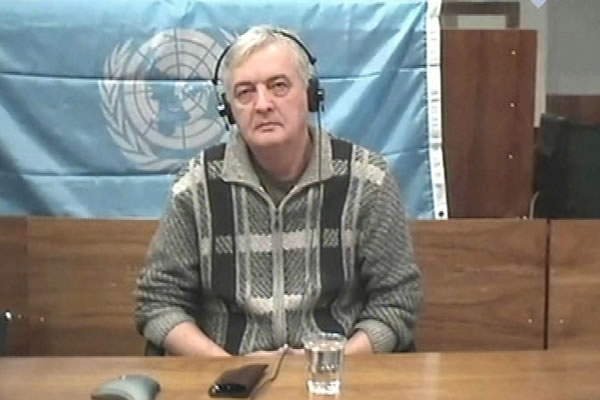Home
IMPUNITY POLICY IN REPUBLIKA SRPSKA ARMY
Through the evidence of Miso Rodic, former intelligence officer in the 43rd Prijedor Brigade, the defense tried to show the multi-ethnic nature of the Republika Srpska Army. The prosecutor on the other hand highlighted the impunity policy pursued by the army vis-à-vis those who committed crimes against the non-Serbs
 Miso Rodic, defence witness at Rako Mladic trial
Miso Rodic, defence witness at Rako Mladic trial Although Miso Rodic’s statement remained under seal, according to the summary read out by Ratko Mladic’s defense counsel in court, the witness participated in the war in Croatia from November 1991, and then in May 1992, he was transferred to the intelligence and security sector in the VRS 43rd Prijedor Brigade.
On 30 May 1992, when the town was attacked, Rodic was not in Prijedor. He later took part in the interrogation of the Green Berets that were captured. In the course of interviewing the prisoners, the witness realized that the Green Berets were against a peaceful solution for the conflict. The Serb forces, on the other hand, wanted to put off using force, the witness stressed, to ‘create a window of opportunity’ for the Crisis Staff set up by the Muslims in the Prijedor area to ‘accept the reality, which was Republika Srpska and the VRS’. Under those circumstances, all ethnic communities in Prijedor have their safety guaranteed, the witness explained.
Defense counsel Branko Lukic went on to stress the multi-ethnic nature of the army, asking the witness questions about the list of about 380 non-Serbs who were purportedly first in the JNA and later joined the VRS, about the officers’ lists and about the information from documents about non-commissioned officers. In the cross-examination, Rodic explained that an ‘authorized clerk’ had drafted the list of non-Serb military conscripts. The list, which also comprised persons who were drafted after the fighting ended in Prijedor, was submitted at the defense’s request.
As he was questioned by prosecutor Arthur Traldi, Rodic confirmed that in June 1992, the security section of the 43rd Prijedor Brigade moved to the building of the Kozarac Putevi company, opposite the Keraterm prison camp. As prosecutor pointed out, Rodic was nevertheless able ‘to remain ignorant’ of the fact that Keraterm was a ‘prison camp for prisoners of war’. Rodic told the prosecutor that he had been in charge of the intelligence segment, not security, in the intelligence and security section.
Rodic also claimed that ‘before today’ he had never heard about Room 3 in Keraterm. In the night of 24 June 1992, more than 150 persons brought in after the ‘clean-up’ operation in the Brda and Biscani area were killed in the room. The region was inhabited by Muslims. Rodic said that he heard ‘rumors’ about the ‘execution’, adding that the security officers received much more information that the intelligence officers. Based on what the witness was able to learn, the people were killed to ‘avenge a police officer who had been killed earlier’. However, the witness stressed that he himself had not conducted an investigation and didn’t know who the perpetrators were.
According to the prosecutor, the same impunity policy was pursued in the case of reserve police officer Zoran Zigic. He was sentenced by the Tribunal to 25 years for his involvement in the crimes against humanity in the Prijedor prison camps. In 1992, Zigic was ‘arrested for looting’ but was soon returned to the unit because he was ‘capable and knew much about explosives’.
The defense case of the former Republika Srpska Army Main Staff commander continues on Monday, 16 March 2015.
Linked Reports
- Case : Mladic
- 2015-03-11 ‘SICK PEOPLE’ COMMITTED CRIMES
- 2015-03-10 THE HYATT HOTEL IN TRNOPOLJE
- 2015-03-09 VOLUNTARY SURRENDER AND KILLING AROUND SREBRENICA
- 2015-03-16 WERE BOSNIAN SERBS FORCED TO SPLIT FROM BH INTERIOR MINISTRY OR WAS IT ALL PART OF A PLAN
- 2015-03-17 ‘TOP PROFESSIONAL’ UNINFORMED
- 2015-03-18 UPLEASANT STENCH OF DEAD BODIES
